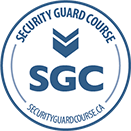Security Guard Powers of Arrest and 10 Codes
As part of your Ontario security training you will be required to know Ten Codes, a method of communication used by Professional Security Guards, outlined by the APCO (Association of Public Safety Communication) and about Powers of Arrest, or when you are entitled to make a Citizen’s Arrest. These are included in SGC’s security guard courses.
What are Ten Codes?
When police radio in criminal activity they use police codes – radio codes to communicate what kind of crime is in progress. These codes are used for privacy in case the frequency is being listened to. Communications while working as a security professional will also take place using radio communications and radio codes. These codes begin with the number 10 and are known as Ten Codes.
Why are Ten Codes used?
Communicating events or situations clearly while remaining discreet are why Ten Codes are used. It is important to discreetly share vital information about events while ensuring privacy and reducing the chances of miscommunication while working in security.
As part of SGC’s ABST and Ontario Security Guard Training a 10 Codes lesson is included. It is recommended that every Ontario Security Guard or Alberta Security Guard memorize the most commonly used 10 Codes before starting work in the security field.
What are the most common 10 Codes?
Some of the most commonly used 10 Codes for communication include:
10-0 Use Caution
10-1 Signal Weak
10-2 Signal Good
10-3 Stop Transmitting
What does 10-4 mean?
10-4 means message received.
Ten codes are also used to describe events taking place that may put the public in danger.
Some of these include:
10-31 Crime in Progress
10-32 Person with Gun
10-33 Emergency – All Units Stand By
10-34 Riot
To learn more about Ten Codes visit this post and to view all 10 Codes visit the MCSCS (Ministry of the Solictor General of Ontario) website.
Now that you are aware of the importance of learning the 10 Codes it is also important to learn about Powers of Arrest, and when and if you are able to arrest someone on the job. If a situation occurs while you wait for emergency personnel, can you make an arrest?
Powers of Arrest
What Powers of Arrest do security guards have?
The Criminal Code of Canada – Section 494 governs when a member of the public can make an arrest granting powers to individuals to make arrests under specific circumstances known as Powers of Arrest. Security personnel are treated as members of the public for the determination of Powers of Arrest, not police officers and therefore must follow the same conduct as outlined in the Canadian Charter of Rights and Freedoms.
Under what circumstances is a security guard allowed to detain someone?
According to the Canadian Charter of Rights and Freedoms, an individual can only be deprived of his/her liberty if he/she has done something that counters the rights of other members of society. Powers of Arrest can be used when preventing a breach of the peace as outlined in Section 30 of the Criminal Code. This entitles members of the public to prevent or detain any person who commits a breach of the peace, (a citizen’s arrest), for the purpose of preventing the continuance of a disturbance, before releasing the individual into the custody of a peace officer. This provision is intended to protect those assisting police in circumstances amounting to a riot. It should not be relied upon in any lesser circumstance.
Security Guards will deal with crimes while on duty. Your ability to understand the difference between indictable, summary, or dual/hybrid offences will give you confidence to make the right decisions when responding and keep you safe physically and legally. To learn more about Powers of Arrest visit this post.
There are three types of offences in the Criminal Code of Canada differentiated by the severity and nature of the offence committed. This presents a serious issue for Security Guards as it may impact their legal ability to affect an arrest and their judgement may be questioned.
Offences punishable under Summary Conviction are the least serious of offences in the Criminal Code. Except in extreme circumstances involving repeat offenders, individuals are subject to a maximum penalty of 6 months imprisonment and a fine of up to $5000.00.
Typically the sentences are less than the maximum penalty however Summary Conviction offences are among the least serious. Incidents involving violence, the possession of large quantities of drugs or weapons, and crimes of a sexual nature are typically not punishable under Summary Conviction.
Offences punishable under Indictment represent the most serious offences such as Murder, Aggravated Sexual Assault, Kidnapping, and Robbery to name a few. Such offences carry serious penalties which usually involve long-term imprisonment and sometimes even include a minimum mandatory sentence to be served.
Finally, Dual Procedure or Hybrid offences (both terms are used which is a great question on the Security Guard Exam) are those which can include differing levels of severity. In such cases, the Crown is given the option of proceeding under Indictment or Summary Conviction based on their interpretation of events.
For example, two individuals are arrested and charged for theft. One person stole a handful of chocolate bars valued at $5.00, while the other stole $4900.00 worth of property. Since the value of both incidents is less than $5000.00, they are both technically arrested for the same crime: CCC S.334(b) Theft Under $5000.00.
As there is a great difference between the two incidents, the Crown would most likely, if proceeding with charges, charge the candy bar thief with a Summary Conviction Offence, and the other thief with an Indictable Offence. In all cases involving a Dual Procedure offence, the offence is deemed to be held under Indictment unless otherwise applied by the Crown.
Do I need to learn Ten Codes and Powers of Arrest to get my Security Guard License in Ontario?
As part of Ontario security testing, those who take the exam are responsible for knowledge of Section 494 of the Criminal Code which outlines Powers of Arrest, and the 10 Codes when they write their Ontario Security Guard Exam. This is also true for Alberta. Knowing the 10 Codes and when to make a citizen’s arrest will not only help you pass your exam so you can apply for your Alberta Security Guard license or your Ontario Security Guard License, it can protect you and the people you are guarding while on the job.
This is why it’s extremely important when considering security training to make sure you are truly prepared with a course that offers the right training on health and safety, use of force, communication and radio 10 Codes. If you are interested in pursuing an Ontario or Alberta security guard license, sign up for our Alberta Basic Security Training course (ABST) or the Ontario Security Guard course today. Both ensure you have the training to be successful and safe while working in the security industry.









